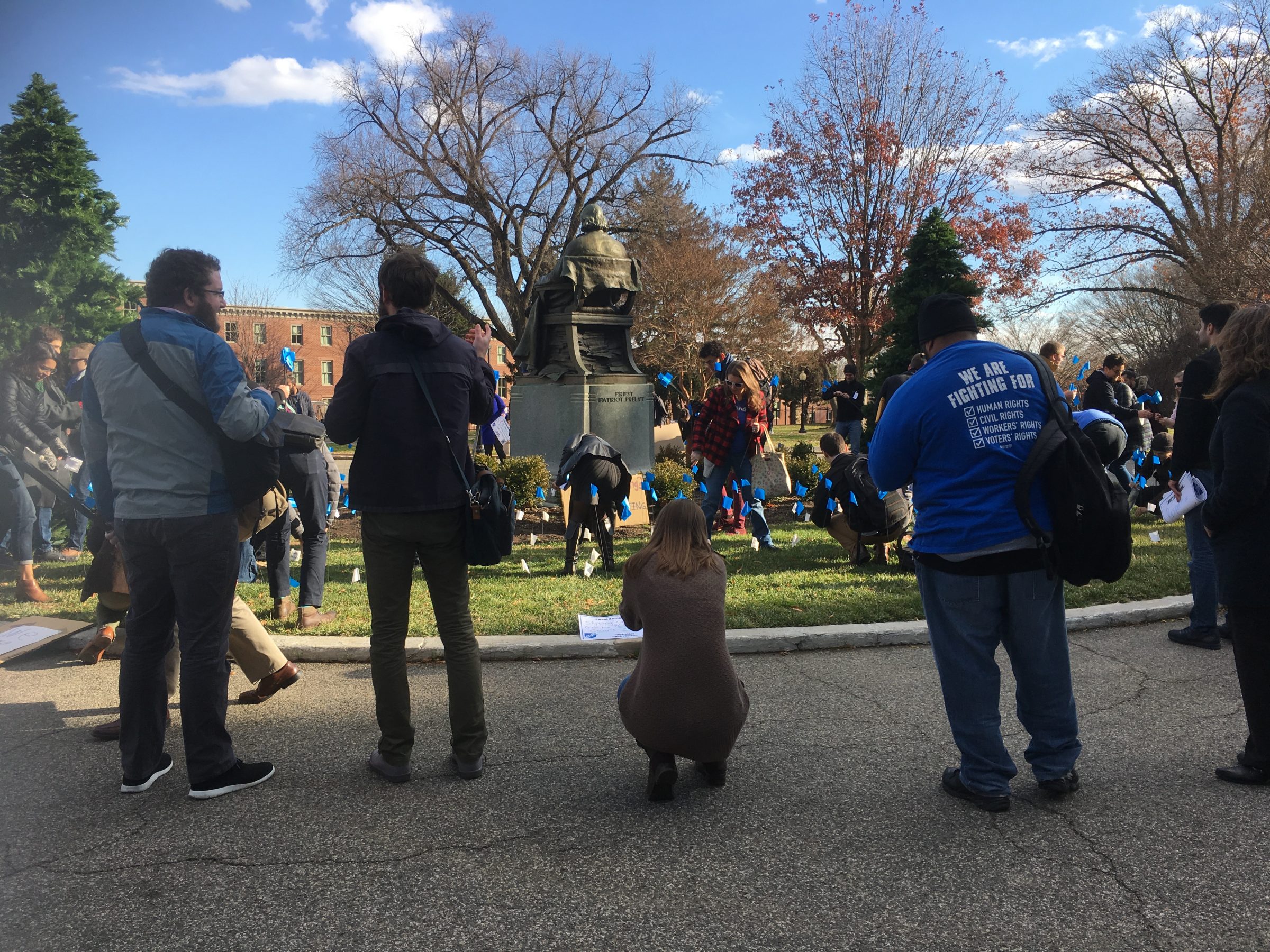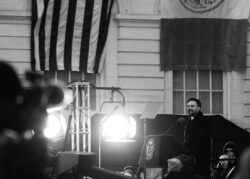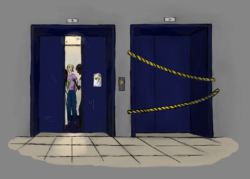On Monday, I was deeply disturbed to learn that the university that taught me the importance of economic justice and the dignity of labor is now refusing to recognize its teaching assistants as workers, in contravention of established federal law, Catholic social teaching, and its own Just Employment Policy.
I spent six years at Georgetown—four as a student, when I was member of the Georgetown Solidarity Committee and the vice president of GUSA, and two as the program manager at the Kalmanovitz Initiative for Labor and the Working Poor. I’m now a first-year law student studying labor law, inspired by the Jesuit education I received not just in Georgetown’s classrooms but also in its cafeteria.
In 2010, the workers in Leo’s and other food service locations around campus voted to form a union. Along with many other students at the time, I played a small part in supporting their efforts. The workers’ victories were among my happiest memories at Georgetown—even better than the basketball game where President Barack Obama watched us beat Duke.
As a Hoya, I was proudest of Georgetown’s commitment to justice evidenced by the university’s Just Employment Policy, which it adopted in 2005 after years of student advocacy culminating in protests and a hunger strike. The JEP promises campus workers a living wage and the right to organize. Since adopting the JEP, the university has respected Georgetown workers’ rights to organize, from the Leo’s workers in 2011 to the adjunct professors in 2013.
Now, as a solid and growing majority of graduate teaching assistants support forming a union, the university is attempting to abandon the JEP by claiming that teaching assistants aren’t workers. Professor Joseph McCartin, one of the nation’s most respected labor historians and director of Georgetown’s Kalmanovitz Initiative for Labor and the Working Poor, wrote about why this decision is so wrong. “This is a sad day for my university, for workers’ rights, and Catholic higher ed,” he wrote.
The JEP is clear—in fact, crystal clear—in its defense of Georgetown workers’ right to organize a union. It reads: “This policy affirms Georgetown’s commitment…that all working members have the right to freely associate and organize, and that the University will respect the rights of employees to vote for or against union representation without intimidation, unjust pressure, undue delay or hindrance in accordance with applicable law.”
In this case, the “applicable law” the JEP references is also crystal clear. In 2016, the National Labor Relations Board (NLRB) recognized that graduate student assistants—in that case, at Columbia University—are employees with the right to form unions and bargain collectively under the National Labor Relations Act. This isn’t a horoscope whose predictions you might agree or disagree with; this is established law.
So why is Georgetown claiming that it doesn’t have to follow established federal law? The answer isn’t that they merely have a difference of opinion about boring questions of administrative law; I think it’s actually much more insidious.
I suspect the university sees an opportunity under President Donald Trump to overturn the NLRB’s ruling. The NLRB is now controlled by Trump appointees who are ruthless opponents of unions and workers’ rights. I believe the university knows that if they are able to appeal this question to Trump’s NLRB, they will likely win—and subsequently be able to erode the rights of graduate student workers not only at Georgetown but across the country.
This wouldn’t be the first time that a university has shown its willingness to side with Trump over its own students. Harvard University, where I’m now a student, is appealing to Trump’s NLRB to let employers argue they shouldn’t be subject to a longstanding rule governing fair union elections. Their appeal would undermine fair elections with potentially devastating effects for not only Harvard’s graduate workers, but all union-eligible workers across the country.
Georgetown has already responded to its graduate workers by devaluing their work. In their letter addressed to the Georgetown Alliance of Graduate Employees on Dec. 4, Provost Robert Groves and Executive Vice President for Health Science Edward Healton implied that graduate assistants’ labor provides no value to the institution and is strictly something they do to further their education.
When I was an undergrad, I took many classes taught solely by graduate students, who were without exception excellent teachers. They certainly provided value in my education as well as that of many undergraduate students, an education for which we paid over $50,000 a year in tuition alone. However, I couldn’t help but notice that the university could get the same amount of classroom labor by paying poverty wages to a graduate assistant instead of paying the salary of a full-time or even part-time professor.
It’s no wonder, then, that Georgetown is choosing to fight its graduate workers. Like Trump, who also fought his workers’ attempts to unionize, the university clearly doesn’t want to lose a cheap source of labor. That’s why it doesn’t want its graduate workers to gain a voice on the job through a union. With a union, the university would have to reckon with the very real concerns of its graduate workers, from unlivable wages to inadequate health care to workplace inequity.
I find it humiliating and horrifying that Georgetown is betraying the Catholic and Jesuit values it professes, as well as the rule of law and frankly basic human decency, by breaking its promise to abide by its Just Employment Policy when it comes to its own student workers. On a personal note, I do not have the words for how betrayed I feel by my alma mater, when I and many others have trumpeted Georgetown’s policy as an example for how other universities and employers around the country can do right by their employees.
I am not a theologian or even a Catholic, but I learned a thing or two from Georgetown’s theology requirement. I am certain that in Matthew 6:3, when Jesus says, “Do not let your left hand know what your right is doing,” he was not referring to this kind of hypocrisy.
As a former employee and a formerly proud alumna, I ask the university to please reconsider their stance on this issue. Or else, they must admit the truth and publicly renounce the university’s commitment to the Just Employment Policy, its Catholic and Jesuit values, and moral leadership.
Vail Kohnert-Yount (SFS ’13) is a student at Harvard Law School.
Image Credit: Rebecca Zaritsky





